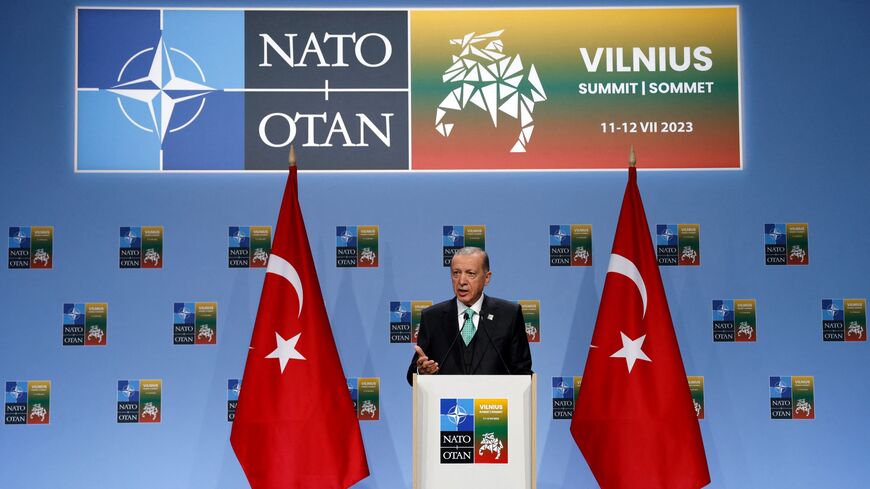WASHINGTON — What seemed like a done deal on Sweden's NATO membership faces more uncertainty.
Turkish President Recep Tayyip Erdogan on Monday unexpectedly dropped his objection to the Nordic country joining NATO, a win for the trans-Atlantic bloc as it sought to present a united front against Russia during this week’s summit in Vilnius, Lithuania.
But hopes for Sweden’s swift accession faded on Wednesday, as Erdogan said the Turkish parliament will take up ratification after lawmakers return from their summer recess in early October.
“The parliament is not in session for the next two months,” Erdogan told reporters in Vilnius on Wednesday. “But our target is to finalize this matter as swiftly as possible.”
Analysts say much could cause Erdogan to backtrack between now and then, such as another Quran-burning demonstration or pro-Kurdish protest in Sweden.
“We're not as close as we thought whenever Erdogan initially made the statement that he will greenlight this,” said Alper Coskun, a former deputy permanent representative for Turkey's NATO mission.
“While Erdogan has greenlit this, what he greenlit is sending it to parliament,” said Coskun. “He will be signaling to the US that unless there's progress on the F-16s, it might be more difficult for parliament” to approve Swedish membership in the alliance.
The Biden administration insists Turkey lifting its opposition to Sweden's bid after a year of blocking it was not linked to the potential sale of F-16 fighter jets. But privately, US officials told Turkey that Sweden's stalled NATO application was the primary obstacle to congressional approval of the long-delayed $20 billion sale, sources close to the Turkish government said.
The White House backs the sale but needs buy-in from the top Democrats and Republicans on the House Foreign Affairs and Senate Foreign Relations committees, who have the power to block it. Behind the scenes, the administration has sought to reassure lawmakers who have indicated Sweden’s accession was a precondition for their support on the F-16s.
State Department spokesperson Matt Miller said Tuesday that Secretary of State Antony Blinken had discussed the issue in recent weeks with Sen. Bob Menendez (D-N.J.), the longtime Turkey critic who chairs the Foreign Relations Committee.
Speaking to reporters Monday, Menendez said he still has concerns about Turkey’s behavior, but if the Biden administration can address them, “there may be a pathway” to sell the Lockheed Martin jets.
The New Jersey Democrat went on to say he’s looking for assurances from the administration that it would beef up Greece's security to give it a "qualitative advantage" in the region.
Providing American-made F-35s to Turkey’s longtime adversary Greece could seal the deal for Menendez. Athens has requested to buy advanced stealth fighter jets from Washington, but the Biden administration hasn’t yet formally notified Congress of its approval.
A House foreign policy aide told Al-Monitor that House Democrats viewed Turkey dropping its objections to Sweden joining NATO as "a significant step forward." But they "still have concerns about violations of Greek sovereignty, Turkish lack of enforcement of Russian sanctions and continued aggression against Kurdish partners."
Menendez remains the hardest sell but said Monday he could make a decision on the F-16s "in the next week." That leaves a short window before the Turkish parliament is expected to take off for its summer recess later this month. (Parliamentary leadership, however, could theoretically call lawmakers back into session at any time to vote on Sweden's ratification.)
Alan Makovsky, a longtime former staffer on the House Foreign Affairs Committee who is now a Turkey analyst at the Center for American Progress, described a chicken-and-egg dilemma for Turkey and the United States.
“I would expect that the administration will try to push Erdogan to ratify immediately, and at the same time try to get Menendez to ‘yes,’” Makovsky said. “It's hard for me to believe that the administration is content to let this thing go until October. … Too much can happen.”








